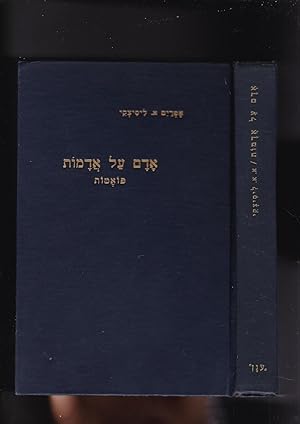lisitzky ephraim introduction menahem ribalow (1 résultats)
Type d'article
- Tous les types d'articles
- Livres (1)
- Magazines & Périodiques
- Bandes dessinées
- Partitions de musique
- Art, Affiches et Gravures
- Photographies
- Cartes
-
Manuscrits &
Papiers anciens
Etat
- Tous
- Neuf
- Ancien ou d'occasion
Reliure
- Toutes
- Couverture rigide
- Couverture souple
Particularités
- Edition originale
- Signé
- Jaquette
- Avec images
- Sans impression à la demande
Pays
Evaluation du vendeur
-
Adam al Adamot: Poemo
Edité par Hotsaat Ogen al yad Ha-Histadrut ha-ivrit be-Amerika, New York, 1947
Vendeur : Meir Turner, New York, NY, Etats-Unis
Livre
Hardcover. Etat : Very Good. No Jacket. In Hebrew. xxii, 256 pages. 234 x 156 mm. ISITZKY, EPHRAIM E. (1885?1962), was a Hebrew poet and educator. Born in Minsk, he immigrated to the United States at the age of 15. In 1918, after peregrinations which took him to Boston, New York, Central Canada, Buffalo, and Milwaukee, he finally settled in New Orleans, where he spent the rest of his life. He became principal of the city's Hebrew School, one of the best in the United States. Lisitzky was a prolific Hebrew poet. He made lasting contributions to the thematic wealth of Hebrew literature. Medurot Do'akhot ("Dying Campfires," 1937), a story of two Indian tribes, is based on Indian legends and contains fine descriptions of the American landscape. It is written in the unrhymed trochaic tetrameter of Hiawatha and Kalevala. Out of black folktales and folk songs, sermons and spirituals, habits and customs, he composed Be-Oholei Kush ("In the Tents of Cush," 1953). In his narrative poem Ki-Teko'a Shofar (1922) he contrasts the spiritual aridity of the small town American Jew with the deep religiosity of Eastern European Jewry (Shirim (1928), 241?80). His dramatic poem Naftulei Elohim (1934), despite some happy phrases, must be considered a failure, overburdened with the poet's mythological inventions and with Jewish, Christian, Islamic, and Buddhist doctrine. Similarly unsuccessful is Bi-Ymei Sho'ah u-Mesho'ah (1960), which deals with the European Holocaust. Lisitzky's occasional articles on literature and educational matters in the Hebrew press were collected in his book, Bi-Shevilei ?ayyim ve-Sifrut (1961). Lisitzky's reputation will ultimately rest on his moving autobiography Elleh Toledot Adam (1949; In the Grip of Cross-Currents, 1959), his book of black poems, and his Indian epic.


